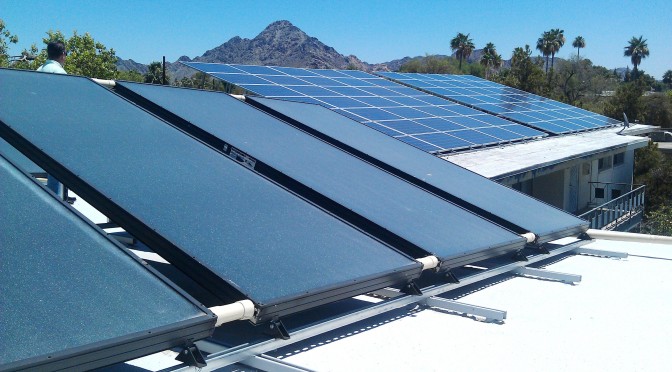June 17–20, 2013, the accompanying Intersolar Europe Conference offers additional insight into and an overview of the most important technologies and trends world-wide.
Solar process heat, the use of solar heat for industrial production processes, is one of the most promising markets of the future for solar thermal technology. Improved subsidies provided by the Federal Office of Economics and Export Control (BAFA) have been offering financial incentives for using solar thermal plants in commercial and industrial operations since last year.
System solutions are another trend in solar thermal technology, integrating efficient heat storage systems as multifunctional storage tanks. Not only do they store heat for the solar installation but they can also be fed by several heat generators, for example by a combination of gas-fired systems and heat pumps.
One of the major topics at Intersolar Europe 2013 (taking place June 19–21 at Messe München) covers the opportunities and potentials of renewable heating. Last year, more than 500 exhibitors showcased their latest products and current developments in the field. From June 17–20, 2013, the accompanying Intersolar Europe Conference offers additional insight into and an overview of the most important technologies and trends world-wide.
Solar process heat is one of the major growth markets within the field of solar thermal technology. Since the launch of the Federal Office of Economics and Export Control’s (BAFA) new market incentive program last August, solar thermal installations have not just become a cost-efficient way of heating appartment buildings, but can also be used in industrial production processes. With relatively low-temperature heat accounting for two thirds of all energy used for industrial purposes, there is great potential here. In particular, companies requiring process temperatures of below 100°C are likely to benefit from solar installations. Solar thermal technology has a wide range of industrial applications, for example in the food processing, chemical and textile industries. Process heat is particularly attractive for breweries because they can use solar process heat to produce a large part of the energy required for brewing. BAFA offers subsidies of up to 50% of investment costs for installations with a gross collector surface of up to 1,000sqm. In view of rising electricity prices and legal regulations on CO2 reduction, switching to solar process heat enables companies to save money while making a significant contribution to changing the energy supply system.
The Growing Importance of Efficient Heat Storage
Efficient heat storage is becoming more and more important in the search for new applications for solar thermal technology. “Storages are becoming more and more multifunctional,” says Dr. Harald Drück, Director of the Research and Testing Center for Thermal Solar Systems (TZS) at Stuttgart University. “They are more than just heat storage tanks for a solar installation. They are used by several heat generators and supply various heat consumers.” To increase the capacity of storage systems, manufacturers have predominantly been investing into insulation. Polyester fleece is frequently being used in place of polyurethane foam to insulate small storage tanks with a capacity of up to 1,000 liters. For larger storage tanks with a volume between 10 and 100m3, there is a trend towards using vaccuum insulation to reduce heat loss.
Intersolar Europe 2013 picks up on the current trends and developments of renewable heating. In Hall B1 at Messe München, a dedicated area for Renewable Heat allows international companies to present technical solutions and system concepts for solar process heat, innovative storage solutions and other solar thermal and heating system technologies. Practical workshops and talking to manufacturers gives visitors the opportunity to get up to date with the many possible applications of renewable heat and the state of the art.
Renewable Heat at the Intersolar Europe Conference
From 17–20 June, 2013, more than 400 speakers and 2,000 attendees spanning 50 countries are expected at ICM International Congress Center München for the Intersolar Europe Conference and side events. The conference consolidates the exhibition topics and places markets and technologies, industry and research in an international context. In addition to many topics concerning photovoltaics and PV production technology, the conference concentrates on Renewable Heating Systems this year. This year’s sessions focus on the international market development of solar thermal technology, the latest trends and developments in the field of heat storage systems and industrial process heat and large-scale thermal power plants.
Intersolar Europe’s leading partners in the solar industry include the German Solar Industry Association (BSW-Solar) as an exclusive partner, the German Solar Energy Society (DGS), the European Solar Thermal Industry Federation (ESTIF), the International Solar Energy Society (ISES), the SEMI PV Group and VDMA-PV, the platform for photovoltaic production equipment within the German Engineering Association. It is also supported by the European Photovoltaic Industry Association (EPIA).
With around 3,000 exhibitors and 100,000 visitors spanning four continents, Intersolar is the world’s leading exhibition series for the solar industry and its partners. It unites people and companies from around the world with the aim of increasing the share of solar power in our energy supply.
Intersolar Europe takes place annually at Messe München, Germany. It is the world’s largest exhibition for the solar industry and its partners. In 2012, 1,909 international exhibitors and 66,000 trade visitors were welcomed to Intersolar Europe. The exhibition focuses on the areas of photovoltaics, PV production technologies, solar thermal technologies and energy storage. Since its founding, it has become the most important industry platform for manufacturers, suppliers, wholesalers, service providers and partners of the solar industry. The accompanying Intersolar Europe Conference consolidates the topics of the exhibition. In 2012, more than 400 speakers and around 2,000 attendees discussed current industry topics and shed light on the background of technological, market and political developments.
Intersolar’s storied history of international exhibitions and conferences spans more than 20 years. In 2008, Intersolar North America in San Francisco became the second exhibition after Intersolar Europe. This was followed by Intersolar India in Mumbai, Intersolar China in Beijing, and Intersolar South America in São Paulo.


